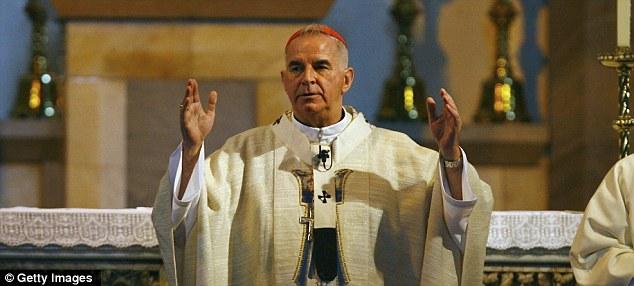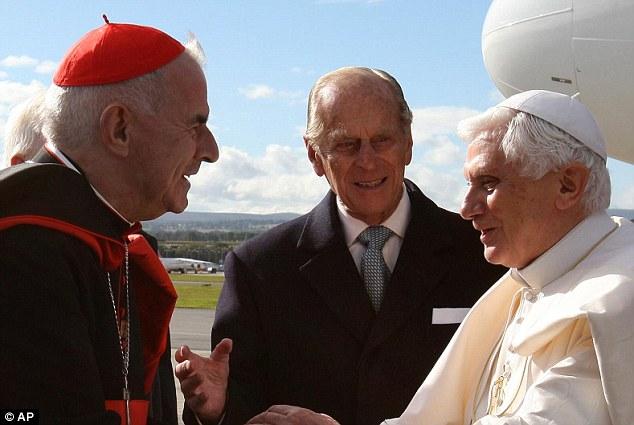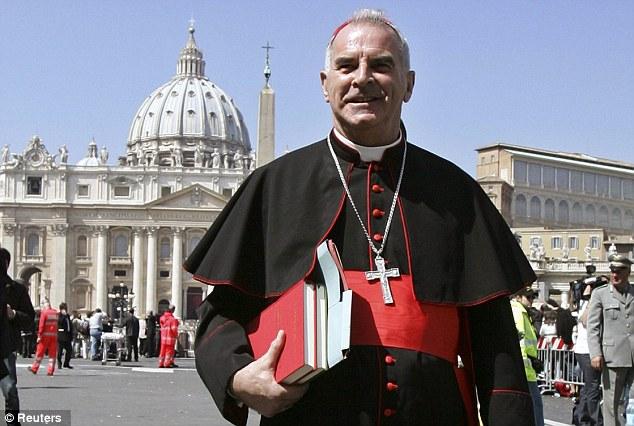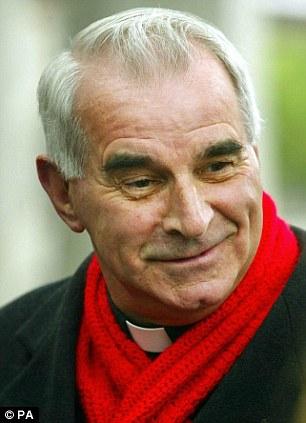Charisma, Courage, but He Had Too Many Enemies
By Guy Adams
Cardinal Keith O’Brien took time out from official duties last week to concentrate on one of the things he loves best: getting himself into the news. After summoning the BBC to his private chapel in Edinburgh at 3pm on Thursday, the de facto leader of Scotland’s 750,000 Catholics declared it was time for his church to end a thousand years of tradition, by allowing priests to marry. ‘It’s a free world,’ he announced, in comments splashed across Saturday’s papers, ‘and I realise that many priests have found it very difficult to keep with celibacy as they lived in the priesthood and have felt the need for … companionship.’ It was a typically newsworthy remark from a 74-year-old man who is nowadays widely known in Catholic circles as the ‘Cardinal of Controversy’, thanks to his uncanny knack of generating headlines, for both himself and his Church. As Archbishop of St Andrews and Edinburgh, and one of only two Cardinals in the UK, O’Brien has in the past decade placed himself at the centre of high-profile disputes over subjects including unborn children’s right to life, gay marriage, contraception, nuclear disarmament and Scottish devolution. He has, among other things, described abortion as a ‘social evil’, dubbed embryo research a ‘monstrous attack on human rights’, and in 2012 used a Radio 4 Today programme interview to call same-sex marriage an ‘aberration’ similar to slavery. Inside the Church, which provides his palatial, copper-roofed official residence in Scotland’s capital, this pugilistic reputation has vehemently divided opinion. Supporters, mostly from conservative quarters of the Church, have often cited O’Brien as one of the most charismatic advocates of traditional Catholic values around today. ‘He has great personal warmth and sincerity,’ says one prominent Catholic writer. ‘One to one he’s incredibly warm and charismatic. Meeting him is like meeting George Clooney or Sean Connery: he has this natural charm and a way of making you feel star-struck.’ A few pundits have even mentioned him as a potential Pope. Only last week, he was being quoted as a 66/1 shot to emerge triumphant from the Papal conclave which starts in Rome today. Yet O’Brien’s high profile has always brought detractors. From the day he was elected President of the Bishops’ Conference of Scotland, in 2002, critics have complained that his public pronouncements bring the wrong sort of attention. Some have quietly carped about his habit of arriving at public events with Press photographers in tow; others have alleged that O’Brien’s assistants spend rather too much of their working week keeping track of his Press clippings. ‘His obsession with PR is a running joke in the Church,’ says another Catholic writer. ‘I’ve heard it called a lovable quirk, but there are plenty of people who would say it smacks of vanity and arrogance.’ To these critics, O’Brien’s frequent media appearances have always betrayed a degree of insecurity. Behind all the righteous bluster, they believe there lies a tortured soul who has always had something to hide. Their eyebrows were set furiously twitching by an earlier portion of O’Brien’s BBC interview last week – hitherto largely ignored – in which he was asked whether he regarded his 48 years in the Priesthood as an unqualified success. ‘You assume responsibilities and you try to live up to them as well as you possibly can,’ went his response, ‘despite your own human weaknesses.’ It is these ‘human weaknesses’ which lie at the centre of the scandal which emerged on Sunday and suddenly forced him from office yesterday. O’Brien’s alleged homosexual misdeeds – which, it must be stressed, he strongly denies – date back more than three decades to the early 1980s, before he was ordained as an Archbishop. The four men making allegations against him – one of whom was 20 when he came into contact with O’Brien – claim to have experienced varying degrees of ‘inappropriate contact’ after being placed in his care while training for the Priesthood. Sources close to the men say one of them decided to tip off the media about their official complaint amid concerns it was being ‘buried’ by Vatican officials anxious to avoid another public sex scandal engulfing a senior figure. Their decision to come forward – after decades of silence – is believed to have been rooted in an old-fashioned political dispute between conservatives and reformers within the British Catholic church. For most of his early career, O’Brien was regarded as a relative liberal, who was open to a softening of the institution’s position on social issues such as contraception, celibacy and gay rights. Born in Northern Ireland in 1938 – his father later worked at the Naval base at Faslane in Scotland – though he was at best a middling student he rose fast within the church thanks to a natural charm and widely-heralded abilities as a public speaker. Regarded as one of the faith’s ‘bright young things’, he was elevated to Archbishop of St Andrews and Edinburgh in 1985, at the age of 47, and set about building a reputation for himself as a vigorous champion of the working class. ‘Keith was in many ways a traditional member of the Northern leftie community in the Catholic Church,’ says one commentator. ‘Wherever they stand on moral matters such as abortion, they are instinctively Left-wing on issues such as social justice, and poverty.’ It was therefore highly upsetting to former allies on the Left that, shortly after taking office, he swung so dramatically rightwards, issuing conservative pronouncements on a slew of social issues. While they brought him friends in Rome, the remarks sparked outrage on the liberal wing of the Church, and also brought opprobrium from English Catholics. Against this backdrop, it is perhaps little wonder that disaffected former colleagues might have sought to expose alleged hypocrisy. They are said to have been particularly maddened by O’Brien’s comments last year that gay relationships are ‘harmful to the physical, mental and spiritual well-being of those involved’. Their complaint, which is currently being handled by Vatican authorities, will be among the first items for the in-tray of an incoming Pope, who must now decide whether to allow O’Brien to remain a ‘Cardinal emeritus’. Whatever his fate, he will surely now be wondering if it was quite such a good idea to attract the nickname Cardinal of Controversy.
|
.
Any original material on these pages is copyright © BishopAccountability.org 2004. Reproduce freely with attribution.



